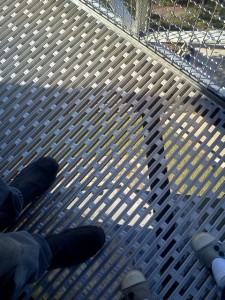 Poems that have been walking in my head this month include Frank O’Hara’s My Heart, which only led me to return to Stephen Crane’s In the Desert, a title I always forget and think of as ‘The Heart.’ I attribute all this heart business to the fact that the past few weeks I’ve been trying to locate my heart as a separate entity from my head, what I feel versus what I know, and making decisions following the heart. The vibe. But where is my heart? Can it really be that separate from… I’ve been looking inside and outside hoping to catch a glimpse of it. Over the years I’ve come to realize that so much depends on my left-handedness, my rational side. A mercy when it’s balanced with the creative, imaginative urges, when the heart is in tune with the head. So I’ve read lots of poems and talked with poets and novelists regarding motion, conflict, and the self. Loving the line: “That’s not like Frank!” And oh, yes, quite like Frank, inserting my name, getting intoxicated with a creative impulse to break out.
Poems that have been walking in my head this month include Frank O’Hara’s My Heart, which only led me to return to Stephen Crane’s In the Desert, a title I always forget and think of as ‘The Heart.’ I attribute all this heart business to the fact that the past few weeks I’ve been trying to locate my heart as a separate entity from my head, what I feel versus what I know, and making decisions following the heart. The vibe. But where is my heart? Can it really be that separate from… I’ve been looking inside and outside hoping to catch a glimpse of it. Over the years I’ve come to realize that so much depends on my left-handedness, my rational side. A mercy when it’s balanced with the creative, imaginative urges, when the heart is in tune with the head. So I’ve read lots of poems and talked with poets and novelists regarding motion, conflict, and the self. Loving the line: “That’s not like Frank!” And oh, yes, quite like Frank, inserting my name, getting intoxicated with a creative impulse to break out.
My Heart by Frank O’Hara
I’m not going to cry all the time
nor shall I laugh all the time,
I don’t prefer one “strain” to another.
I’d have the immediacy of a bad movie,
not just a sleeper, but also the big,
overproduced first-run kind. I want to be
at least as alive as the vulgar. And if
some aficionado of my mess says “That’s
not like Frank!”, all to the good! I
don’t wear brown and grey suits all the time,
do I? No. I wear workshirts to the opera,
often. I want my feet to be bare,
I want my face to be shaven, and my heart–
you can’t plan on the heart, but
the better part of it, my poetry, is open.
From The Collected Poems of Frank O’Hara, edited by Donald Allen. Univ. of California Press, 1995.
On to Stephen Crane’s poem, “In the Desert.”
Twentieth-Century American Poetry (2004)
I still marvel at the simple, surreal twist. It comes off organically, molding me into believing that it’s an easy thing to do, but that’s the deception. The more contemporary writer who is embracing this kind of absurdity/surrealism with energy and spunk is Dean Young, with whom I’ve become acquainted of late. Since I’m in a comparative mode, I’ll close with two poems by Dean Young for your enjoyment.
The Infirmament
An end is always punishment for a beginning.
If you’re Catholic, sadness is punishment
for happiness, you become the bug you squash
if you’re Hindu, a flinty space opens
in your head after a long night of laughter
and wine. For waking there are dreams,
from French poetry, English poetry,
for light fire although sometimes
fire must be punished by light
which is why psychotherapy had to be invented.
A father may say nothing to a son for years.
A wife may keep something small folded deep
in her underwear drawer. Clouds come in
resembling the terrible things we believe
about ourselves, a rock comes loose
from a ledge, the baby just cries
and cries. Doll in a chair,
windshield wipers, staring off
into the city lights. For years
you may be unable to hear the word monkey
without a stab in the heart because
she called you that the summer she thought
she loved you and you thought you loved
someone else and everyone loved
your salad dressing. And the daffodils
come up in the spring and the snow covers
the road in winter and the water covers
the deep trenches in the sea where all the time
the inner stuff of this earth surges up
which is how the continents are made
and broken.
“The Infirmament” from First Course in Turbulence. University of Pittsburgh Press, 1999.
Poem Without Forgiveness
The husband wants to be taken back
into the family after behaving terribly,
but nothing can be taken back,
not the leaves by the trees, the rain
by the clouds. You want to take back
the ugly thing you said, but some shrapnel
remains in the wound, some mud.
Night after night Tybalt’s stabbed
so the lovers are ground in mechanical
aftermath. Think of the gunk that never
comes off the roasting pan, the goofs
of a diamond cutter. But wasn’t it
electricity’s blunder into inert clay
that started this whole mess, the I-
echo in the head, a marriage begun
with a fender bender, a sneeze,
a mutation, a raid, an irrevocable
fuckup. So in the meantime: epoxy,
the dog barking at who knows what,
signals mixed up like a dumped-out tray
of printer’s type. Some piece of you
stays in me and I’ll never give it back.
The heart hoards its thorns
just as the rose profligates.
Just because you’ve had enough
doesn’t mean you wanted too much.
Poem from The Paris Review.
What Tony Hoagland says about Dean Young: “Anyone with a heartbeat knows that Dean Young has become a crucial nucleotide in the DNA of American poetry.” I agree, but is it only the DNA of American poetry or poetry in general? I’m not one for categories. Feel free to share your poem of the month.







No comments yet.